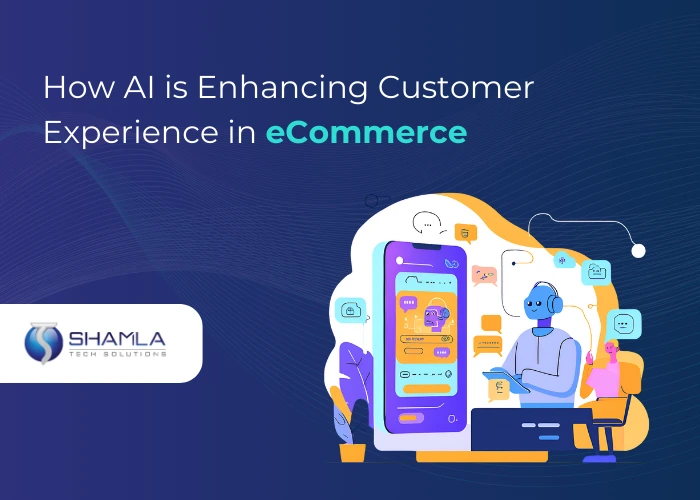Like many other sectors, artificial intelligence has undergone significant change, so it is also in the e-commerce sector. Many various kinds of alteration are about to occur here. AI has natural language processing, machine learning, and predictive analytics in the e-commerce space. AI in e-commerce has also made it more personalized and fasterly interacted with by smarter development. Therefore, artificial intelligence in e-commerce has enabled more consumers of the company, so raising its income from business operations.
Faster consumer interaction, processing of complicated data, and customized shopping services driven by artificial intelligence in eCommerce are transforming the future of business. Studies reveal that user interactions with the e-commerce company supporting companies in revenue growth also increase in count. AI in e-commerce, combining predictive analytics with natural language processing, improves the consumer experience, hence raising customer loyalty. Let’s investigate artificial intelligence in e-commerce and how it is enhancing customer experience success.
AI in eCommerce Driving Successful Customer Experience
1. Product Recommendations in Advanced Way
One advantage of artificial intelligence for online buying is it gives consumers tailored product recommendations. Personalizing eCommerce driven by artificial intelligence allows one to suggest goods to consumers. It examines the behavior of the consumer concerning the kind of products they are looking for and suggests the one based on that.
2. Enhanced Marketing & Content Strategy
Any company uses marketing to reach success. Though AI in eCommerce supports marketing and content strategy as well, only obtaining tailored recommendations is not the limit. Including artificial intelligence into e-commerce enables e-commerce systems to design their tailored email campaigns. Targeted adverts and tailored offers produced by this email marketing campaign are shown to specific clients. Analyzing past purchase behavior, demographics, localities, etc. helps one more likely to focus on the audience. Then, using these elements, design the commercials.
3. Dynamic Pricing Methodology
Examining AI-driven eCommerce patterns helps one to create dynamic pricing policies. By means of this, the e-commerce company can modify the pricing depending on consumer demand, behavior, and market competitiveness. In e-commerce, artificial intelligence can also examine several outside variables including geography, time, temperature, and location. These segments let AI provide individual consumers tailored prices.
4. Enhanced client care
Consumers always want for the prompt reply for their questions. React quickly to raise client involvement and turn them into leads. Two significant elements that have transformed e-commerce customer services are artificial intelligence-powered virtual assistants and chatbots. These elements provide the client customized support for their query and problems as well as a solution.
5. Search Result Navigating and Optimizing
Navigating the items and search results are another important area where artificial intelligence in eCommerce is advancing. AI can adjust what the user is looking for and hence improve the search experience, producing pertinent results. It examines past search behavior to identify the specific needs of the client. This lowers the time spent on consumer product searches and helps increase accuracy.
Furthermore, artificial intelligence in eCommerce has greatly helped websites to be navigable. Examining consumer behavior points to a homepage, customized product lines, and seamless checkout flow. AI-driven optimization results in an easy shopping experience fit for the needs of the consumer.
AI-Driven Personalization in eCommerce
AI in Retail Operations
AI in the Retail Industry: Enhancing Customer Engagement
AI Applications in eCommerce
Now expanding rapidly in many sectors, artificial intelligence has also been more helpful to the e-commerce sector. These are eCommerce applications of artificial intelligence.
Combining artificial intelligence chatbots will offer speedy and effective client assistance. This covers responding to consumer inquiries and guiding them towards the appropriate purchase.
The artificial intelligence system makes a significant contribution to identify unsuspicious behavior and fraud. For stores, this helps to lower risk and improve customer security.
The most current development applied in the e-commerce sector is picture recognition technology. It facilitates analysis of the product by means of size and color recognition, therefore enabling its identification.
Including artificial intelligence into the e-commerce company helps one to foresee the future. It enables e-commerce businesses to forecast consumer future buying trends. For stores as well, this facilitates improved business decisions.
Among the well-known voice assistants are Google Assistant, Amazon, and Alexa. Shopping is another aspect. By means of speech commands, this integration of voice-activated shopping enables consumers to easily search for products.
Future Aspects of AI in eCommerce
Since artificial intelligence is becoming more and more used, its future seems to be favorable. Its future is really bright in the next years. This technology will allow e-commerce companies to lower their running expenses. Furthermore, it enhances the online buying experience by means of automated features.
Using artificial intelligence in the e-commerce sector would enable a more flawless user experience for the clients. This is so because it boasts exceptional artificial intelligence integration ranging from virtual assistants to physical product recommendations to AI chatbots. As technology is being used more and more, artificial intelligence has limitless possibilities in the e-commerce sector.








